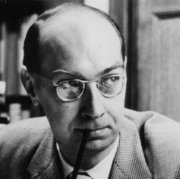ART AND LIFE – DISTORTIONS THAT CLARIFY
In my February 6, 2012 blog post, I made a reference to Philip Larkin, saying how much I admired the poet’s work. At the time, I knew nothing about his biography, not until the February issue of “Harper’s” arrived in the mail. According to the writer, Giles Harvey, who provided a monograph on Larkin’s life, the poet was a man of easy virtue and numerous prejudices, particularly against women. While much of his background was probably known to many, the information came as a surprise to me. I felt like someone who’d been out for a leisurely stroll and finds himself suddenly plunged down a manhole.

(Philip Larkin photo courtesy: www.poetry.com)
Logically, I tried to separate the details of his biography from my admiration for his work but came to the same dilemma Harvey expressed:
“Even if we end up deciding that the poetry is of the life a thing apart, our sense of Larkin’s Englishness is inevitably tainted… “ (“Never Such Innocence,” Giles Harvey, “Harper’s” 2/2012)
I had to ask myself if Larkin was playing fair when his art painted one face and disguised another. I’d met contradictions before. Maurice Sendak swears he hates his life and yet, “Where the Wild Things” Are delights children around the globe. Should I despise his creation because he failed to disclose he is a misanthrope?
To his credit, Larkin seemed to take as dim a view of himself as some others did. In 1984 when he might have been appointed England’s poet laureate, he declined. Harvey interprets that decision as Larkin’s self loathing, even for his work.
Of course, Harvey’s interpretation is just that. What mattered most to me was my reaction when I learned of Larkin’s background. Faced with his dubious character, such “uffish” thoughts assailed me… such righteous indignation, that one would have thought I’d been raised in a nunnery. Far from it. Why then was I so quick to judge? To feel betrayed?
After grappling with my thoughts, my admiration for Larkin’s poetry returned. His work has more than once opened my eyes. What more can I ask of another human being?